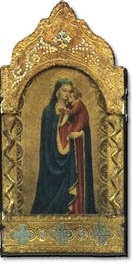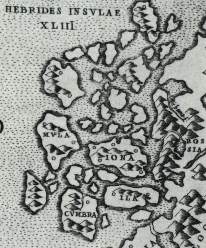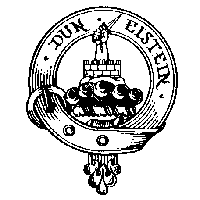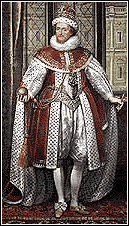
|
Part Two: The Morrisons of the Outer Hebrides by Andrew Morrison
Nobody can tell for certain what our origins were. But it is worth mentioning a study by "mac Gille Chaluim" (son of a servant of St Columba, or, in English, probably " Malcolm"). His examination of the names of brieves In any case variants of "Cian" (otherwise a very rare name) remained in use by Morrisons for some time, and many were known interchangeably as Mackinnons (mac Cianain), as well as MacVurichs (mac Mhuirich), while in no way connected to the principal clans of those names. Incidentally, traditions traceable to the late 17th century would explain this by making our eponymous ancestor be the 14th century son of a "Ceadhain mac Mhuirich" of the line of Somerled (thus linking us to royalty via the MacDonalds rather than the MacLeods): it is quite possible that a leading MacDonald did marry into, and adopt the name of, the Morrisons; but, given the meaning of mac Ghille Mhuire, any attempt to find an eponymous ancestor in the conventional way is likely to appear suspect. (Another legend explains the name by saying that a defeated leader promised to name the clan after the Virgin if she would only deliver them from their foes: she did, using a variant of the device employed by Moses at the Red Sea, and hence the name!) As for the name mac Mhuirich, its root is close enough to mac Ghille Mhuire to raise the possibility of a common origin.
Mac Gille Chaluim's theory, linking us to much earlier settlers from Ireland, ties in intriguingly with evidence of the travels of one of the early Irish saints, St. Moluag (or Lugaid) of Lismore. Might "Clan Cian" or Clan Morrison even be the remnant of a Moluag "familia", in the same way that we speak of the Columban familia, including such places as Iona, Derry and Kells?Could they have survived the brutal Viking raids beginning in 794, which brought "red martyrdom" to the monks of Iona and other Christian settlements? Perhaps, if their base (Pabbay?) was relatively unattractive and they had made known their decision to use the arts of war in their own defense. There might even be found, in their resistance, the seeds of some future reputation for the manufacture of "magical" weapons.
It is possible that the Brieves were originally something more than mere arbiters of civil disputes, but, as representatives of the Lords, had an extended function almost like that of Governors. This would explain why the institution survived and flourished during the sovereign Lordship, why it was resented by the MacLeods, why the brieveship could not long survive the demise of the Lordship, and why we see a MacLeod enlisting the support of the Scottish crown in Dunfermeline to aid his feud with the clan. Ultimately, all one can really claim for this theory, is plausibility. But it is worth noting that it does also make sense of the tradition, in those ancestor stories, that the original stronghold of the clan was not in Lewis, but on the Isle of Pabbay between Harris and North Uist. If they were deliberately planted in Ness, and if they were really Gaelic rather than Norse, then it makes sense that their old home base in the Hebrides was somewhere further south. Even the name Pabbay (a Norse word meaning the priests' isle) has a real Morrison air to it. Nobody lives there today (the last Morrisons were evicted in the 1840s by the exciseman for illicit whisky distilling) but the family of Pabbay (Teaghlach Phabbay) survives and it is from this ancient line that the chief, Morrison of Ruchdi, traces his descent. Meet the author, Andrew Morrison
Back to The Morrisons of the Outer Hebrides, Main Page |
Thursday, December 26th, 2019
Attention visitors: Tartans.com is back. Please note that this is a snapshot of the site as it existed nearly 20 years ago and you may encounter broken links; we are still combing through the site and correcting those as we find them. Please also note that some sections are currently not functional, primarily the discussion forums/clan chat boards.
|
** HOME - First Time Visitors - Glossary - - Contact Us ** Awards | Bibliography | Clan Calendar | Clan Chat | Clan Finder | History | Famous Scots | Genealogy | Great Hall of the Clans | Links | News and Features | Scots on the Net | Search | Site Map The Gathering of the Clans
Copyright 1995- Tartans.com - All Rights Reserved. |

 He reportedly arrived in the Hebrides in 562, a year before Columba, and from his base in Lismore traveled north and west, perhaps founding small monasteries. Amazingly there are Kilmoluags in Raasay and Pabbay, both the kind of small island that the Celtic saints sought out, and a Teampull Mholuaig at Europie in Ness, by Dun Eistein. Can this really be a coincidence? One should remember that Celtic monasteries were not always celibate places, hence the names MacNab (son of the abbot), MacPherson (of the parson) and MacTaggart (of the priest). They were often, or eventually, a cross
between a Celtic Christian tribal settlement and a modern kibbutz. Their clannishness is evidenced by the fact that the modern Gaelic word for family, muinntir, derives from the Latin for monastery.
He reportedly arrived in the Hebrides in 562, a year before Columba, and from his base in Lismore traveled north and west, perhaps founding small monasteries. Amazingly there are Kilmoluags in Raasay and Pabbay, both the kind of small island that the Celtic saints sought out, and a Teampull Mholuaig at Europie in Ness, by Dun Eistein. Can this really be a coincidence? One should remember that Celtic monasteries were not always celibate places, hence the names MacNab (son of the abbot), MacPherson (of the parson) and MacTaggart (of the priest). They were often, or eventually, a cross
between a Celtic Christian tribal settlement and a modern kibbutz. Their clannishness is evidenced by the fact that the modern Gaelic word for family, muinntir, derives from the Latin for monastery.
 Mac Gille Chaluim uses his theory of our Gaelic ethnicity to explain why, centuries later (after 1300), some of the clan became established in Ness (perhaps taking with them their veneration of St. Moluag), and why they were constantly at odds with other Lewis clans like MacLeod and MacAulay. He suggests that the Gaelic Lords of the Isles deliberately planted them there in order to ensure that the traditions of Celtic or "Brehon" Law were observed by the Norse settlers.
Mac Gille Chaluim uses his theory of our Gaelic ethnicity to explain why, centuries later (after 1300), some of the clan became established in Ness (perhaps taking with them their veneration of St. Moluag), and why they were constantly at odds with other Lewis clans like MacLeod and MacAulay. He suggests that the Gaelic Lords of the Isles deliberately planted them there in order to ensure that the traditions of Celtic or "Brehon" Law were observed by the Norse settlers. Feudal Scotland, as the new colonial power (at least nominally), had an obvious interest in suppressing vestiges of the old way. In 1605, at the invitation of the Stuart
Feudal Scotland, as the new colonial power (at least nominally), had an obvious interest in suppressing vestiges of the old way. In 1605, at the invitation of the Stuart